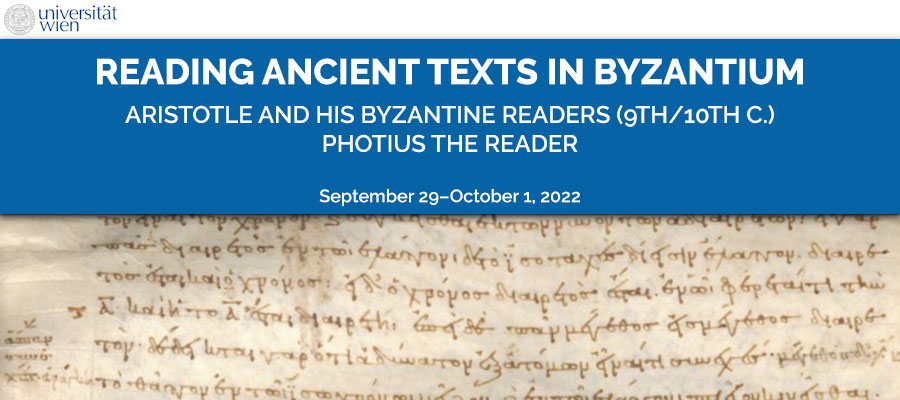Reading Ancient Texts in Byzantium: Aristotle and his Byzantine Readers (9th/10th c.): Photius the Reader, University of Vienna and Zoom, September 29–October 1, 2022
This workshop aims at improving our understanding of the use of classical and philosophical texts in Byzantium thanks to new sociohistorical approaches.
The first day of the workshop is focusing on the manuscripts containing texts of Aristotle up to the 9th / 10th century and their analysis regarding aspects of palaeography, codicology and transmission of texts. The main question is centered on the scholars who ordered or used these texts. In this respect, the “material” study of the manuscript will provide additional information about the circles in which Aristotle was read and studied. The workshop will present the results of meticulous analyses of the earliest preserved papyri and manuscripts of Late Antiquity and the early Byzantine period. The majority of them is preserved in minuscule script which confronted the Byzantine “editor” / scribe with the problem of understanding and structuring the text according to the newly applied system of (complete) Byzantine punctuation (and accentuation). The text had to be divided into logical reading units. Some manuscripts of this time use a more elaborate system of punctuation than the classical one of Dionysios Thrax; it reflects an intense reading of the text, undertaken in academic circles.
Each contributor will present a manuscript in its socio-cultural context of production and address the following points:
- the time of production, according to the palaeographical and codicological analysis
- the presentation of the text (the text itself and paratextual elements structuring the text, titles, ethica, marginalia, script in marginalia, preconditions of reading)
- the script and its particular use for this (and maybe other) manuscript(s) (conclusions regarding the scribe[s]; hints to theatron readings)
- the interests of the reading circle as reflected by the ordering of the texts (based on observations of the script and scribe)
- the script and its punctuation (how many distinctive markers, correctly applied, additional markers, did the scribe / redactor correctly understand the text and divide the cola?)
- the text and text corpus (text composition regarding the textual transmission; new composition of an Aristotelian corpus / philosophical corpus; which intention lays behind a particular composition of different texts?)
- the reader(s) / user(s) of the manuscripts (contemporary, later; which signs did they leave; how did they understand or correct the text; did later readers / users comment on the texts; did later readers / users correct the colon units and, thus, the punctuation to give the phrase a different meaning; did later users / readers add something?)
The second day of the workshop is focused on the figure of the learned Patriarch Photius and his well-known passionate relation to books. We will mainly discuss his famous work gathering critical lecture notes, the so-called Library or Myriobiblos.
Organizers: Christophe Erismann and Christian Gastgeber
Advance registration required for Zoom participation.
